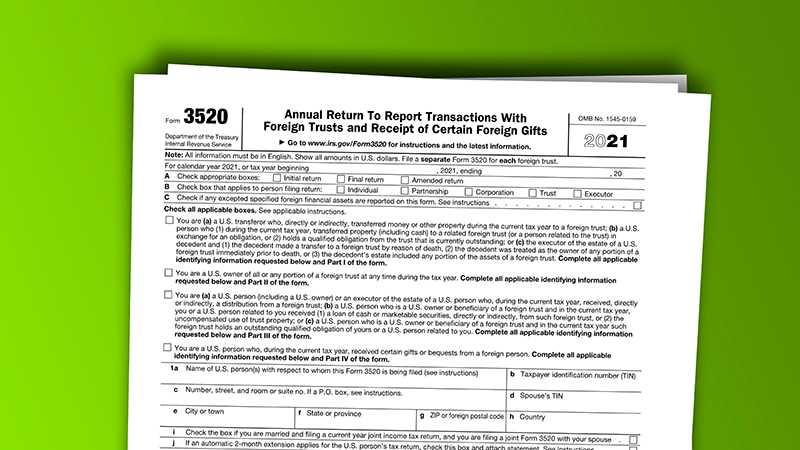IRS Form 3520 inheritance: everything you need to know
Wiki Article
Comprehending the Significance of Coverage Foreign Inheritance to IRS for Tax Obligation Conformity
Maneuvering the intricacies of foreign inheritance requires a clear understanding of IRS reporting obligations. Many individuals underestimate the relevance of accurately reporting these assets, which can bring about unintentional consequences. Falling short to conform with IRS policies may lead to lawful complications and significant fines. It is vital to grasp the subtleties surrounding foreign inheritances to avoid pitfalls. The following areas will make clear crucial aspects of conformity and the possible dangers involved.
What Constitutes Foreign Inheritance?
When a private obtains assets from a dead person's estate located outside of the United States, this transfer is thought about a foreign inheritance. Foreign inheritances can include numerous kinds of properties such as genuine estate, bank accounts, investments, personal possessions, and service interests. The value and nature of these assets might differ noticeably depending upon the legislations and customizeds of the nation in which the estate lies.Additionally, the procedure of obtaining these assets can entail maneuvering via foreign lawful systems, which may enforce details requirements or tax obligations associated with inheritance. The recipient might also come across obstacles in establishing the reasonable market price of the inherited properties, particularly if they are not aware of the neighborhood property or financial markets. Understanding what makes up an international inheritance is important for individuals to assure conformity with both regional laws and any type of potential commitments they might have in their home country.
IRS Coverage Demands for Foreign Inheritance
How does one guide with the IRS coverage needs for foreign inheritance? Individuals that get an inheritance from abroad has to understand details reporting commitments to guarantee conformity with IRS regulations. The Foreign Bank and Financial Accounts Report (FBAR) is one important requirement; if the overall value of international accounts goes beyond $10,000 any time throughout the year, it should be reported. Additionally, Kind 3520 might be needed for reporting foreign presents or inheritances over $100,000 from non-U.S. persons. This kind records details about the inheritance, consisting of the resource and quantity. Falling short to follow these coverage demands can lead to substantial fines. It is crucial for receivers to keep comprehensive records of the inheritance, consisting of any type of paperwork from international entities. Consulting with a tax professional well-informed about worldwide tax laws can offer more guidance in steering via these reporting responsibilities properly.Tax Obligation Ramifications of Getting an Inheritance From Abroad
Getting an inheritance from abroad can lug significant tax implications for individuals, specifically as they browse the intricacies of global tax obligation legislations. The IRS needs U.S. citizens and people to report international inheritances, which might cause different tax obligation commitments - IRS Form 3520 inheritance. Although inheritances themselves are generally not thought about taxed earnings, reporting is vital to avoid finesAdditionally, the estate may be subject to estate taxes in the international country, which can affect the internet value received by the successor. If the inheritance includes foreign properties, such as realty or investments, they might include distinct tax obligation considerations, consisting of possible funding gains taxes upon sale.
People may need to comply with foreign tax regulations, which can vary significantly from U.S. laws. Comprehending these implications is necessary for correct tax obligation compliance and to ensure that all obligations are met without incurring unneeded costs or legal issues.
Usual Errors to Prevent When Coverage Inheritance

Actions to Make Sure Conformity With IRS Laws
Recognizing the steps needed to ensure conformity with IRS laws is essential for any person reporting a foreign inheritance. First, individuals need to confirm whether the inheritance surpasses the reporting limit, which can trigger added requirements. Next off, it is essential to gather all relevant documents, including the will, depend on files, and documents of the international estate's value.Sending Kind 3520, which particularly deals with international gifts and inheritances, is crucial to inform the IRS of the inheritance. Individuals need to likewise make certain that any kind of appropriate taxes connected to the inheritance are paid, consisting of potential estate taxes in the foreign jurisdiction.
Additionally, keeping accurate documents of all communications and transactions regarding the inheritance can supply needed support in case of an IRS questions. Seeking expert advice from a tax advisor accustomed to worldwide tax regulations can better enhance conformity and minimize dangers linked with reporting foreign inheritances.
Often Asked Questions
What Occurs if I Fail to Report My International Inheritance?
Stopping working to report a foreign inheritance can cause considerable penalties, passion on overdue taxes, and possible lawful consequences. The IRS may seek enforcement activities, making complex future economic dealings and conformity commitments for the specific entailed.Can I Deduct Expenditures Associated With Receiving Foreign Inheritance?
No, expenditures associated with getting an international inheritance are normally not insurance deductible for tax purposes. Inheritance itself is typically ruled site link out taxed income, and associated costs can not be declared to reduce tax obligation obligation.Exist Penalties for Late Coverage of Foreign Inheritance?
Yes, there are penalties for late reporting of international inheritance useful link to the IRS - reporting foreign inheritance to IRS. These can include fines and interest on overdue taxes, making timely disclosure necessary for compliance and avoiding added economic worriesJust How Does Foreign Inheritance Impact My State Taxes?
Foreign inheritance might affect state taxes in different ways depending on territory. Some states impose inheritance or estate tax obligations, while others do not. It is important to get in touch with regional regulations to determine specific tax effects related to foreign inheritance.
Are Gifts From Abroad Taken Into Consideration Foreign Inheritance for IRS Purposes?
Presents from abroad are not identified as international inheritance for IRS objectives. IRS Form 3520 inheritance. Instead, they are dealt with individually under present tax guidelines, with various reporting demands and limits that individuals must abide by for conformityAdditionally, the procedure of getting these possessions can include steering through international legal systems, which may enforce specific demands or taxes associated to inheritance. The IRS calls for U.S. residents and citizens to report international inheritances, which may activate different tax obligation obligations. Sending Kind 3520, which especially resolves international gifts and inheritances, is click here for more info essential to inform the IRS of the inheritance. Stopping working to report a foreign inheritance can lead to substantial charges, passion on unsettled taxes, and potential legal effects. No, expenditures associated to receiving an international inheritance are typically not deductible for tax objectives.
Report this wiki page